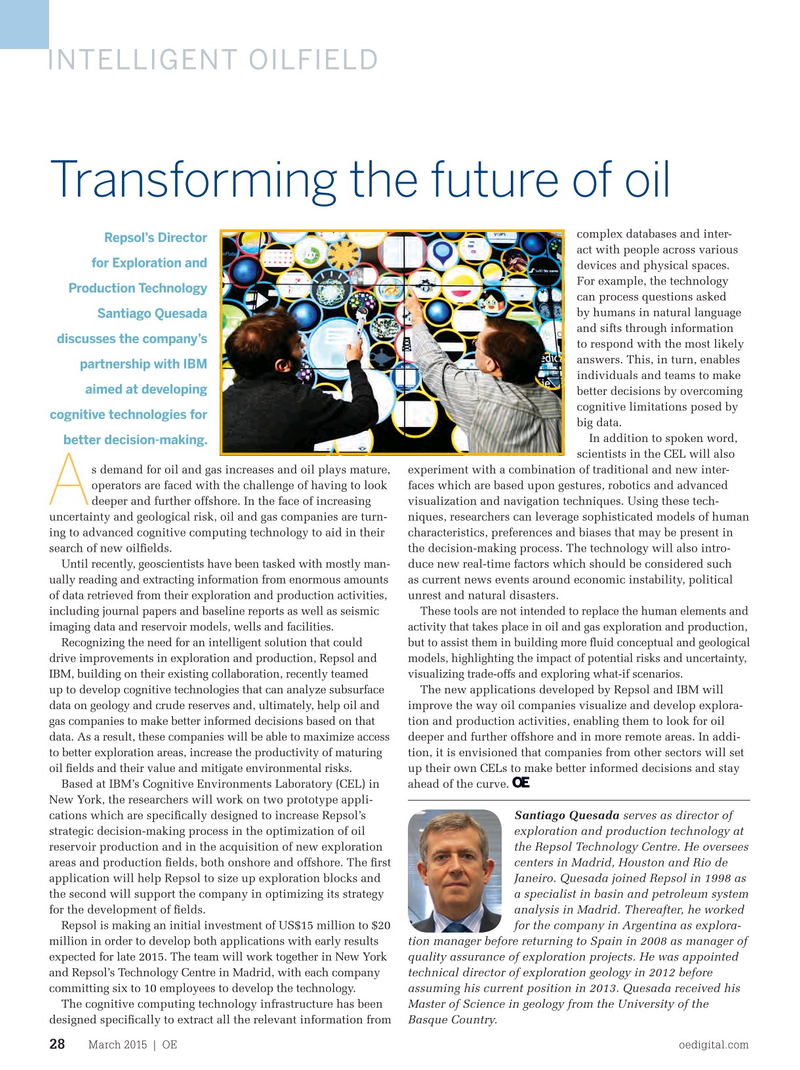
Page 26: of Offshore Engineer Magazine (Mar/Apr 2015)
Read this page in Pdf, Flash or Html5 edition of Mar/Apr 2015 Offshore Engineer Magazine
INTELLIGENT OILFIELD
Transforming the future of oil complex databases and inter-
Repsol’s Director act with people across various for Exploration and devices and physical spaces.
For example, the technology
Production Technology can process questions asked by humans in natural language
Santiago Quesada and sifts through information discusses the company’s to respond with the most likely answers. This, in turn, enables partnership with IBM individuals and teams to make aimed at developing better decisions by overcoming cognitive limitations posed by cognitive technologies for big data.
In addition to spoken word, better decision-making.
scientists in the CEL will also s demand for oil and gas increases and oil plays mature, experiment with a combination of traditional and new inter- operators are faced with the challenge of having to look faces which are based upon gestures, robotics and advanced
A deeper and further offshore. In the face of increasing visualization and navigation techniques. Using these tech- uncertainty and geological risk, oil and gas companies are turn- niques, researchers can leverage sophisticated models of human ing to advanced cognitive computing technology to aid in their characteristics, preferences and biases that may be present in search of new oilfelds. the decision-making process. The technology will also intro-
Until recently, geoscientists have been tasked with mostly man- duce new real-time factors which should be considered such ually reading and extracting information from enormous amounts as current news events around economic instability, political of data retrieved from their exploration and production activities, unrest and natural disasters.
These tools are not intended to replace the human elements and including journal papers and baseline reports as well as seismic activity that takes place in oil and gas exploration and production, imaging data and reservoir models, wells and facilities. but to assist them in building more fuid conceptual and geological
Recognizing the need for an intelligent solution that could models, highlighting the impact of potential risks and uncertainty, drive improvements in exploration and production, Repsol and visualizing trade-offs and exploring what-if scenarios.
IBM, building on their existing collaboration, recently teamed
The new applications developed by Repsol and IBM will up to develop cognitive technologies that can analyze subsurface improve the way oil companies visualize and develop explora- data on geology and crude reserves and, ultimately, help oil and tion and production activities, enabling them to look for oil gas companies to make better informed decisions based on that deeper and further offshore and in more remote areas. In addi- data. As a result, these companies will be able to maximize access tion, it is envisioned that companies from other sectors will set to better exploration areas, increase the productivity of maturing up their own CELs to make better informed decisions and stay oil felds and their value and mitigate environmental risks.
Based at IBM’s Cognitive Environments Laboratory (CEL) in ahead of the curve.
New York, the researchers will work on two prototype appli-
Santiago Quesada serves as director of cations which are specifcally designed to increase Repsol’s exploration and production technology at strategic decision-making process in the optimization of oil the Repsol Technology Centre. He oversees reservoir production and in the acquisition of new exploration centers in Madrid, Houston and Rio de areas and production felds, both onshore and offshore. The frst
Janeiro. Quesada joined Repsol in 1998 as application will help Repsol to size up exploration blocks and a specialist in basin and petroleum system the second will support the company in optimizing its strategy analysis in Madrid. Thereafter, he worked for the development of felds. for the company in Argentina as explora-
Repsol is making an initial investment of US$15 million to $20 tion manager before returning to Spain in 2008 as manager of million in order to develop both applications with early results quality assurance of exploration projects. He was appointed expected for late 2015. The team will work together in New York technical director of exploration geology in 2012 before and Repsol’s Technology Centre in Madrid, with each company assuming his current position in 2013. Quesada received his committing six to 10 employees to develop the technology.
Master of Science in geology from the University of the
The cognitive computing technology infrastructure has been
Basque Country.
designed specifcally to extract all the relevant information from
March 2015 | OE oedigital.com 28 028_OE0315_Feat2-Repsol_em1.indd 28 2/22/15 12:18 PM

 25
25

 27
27